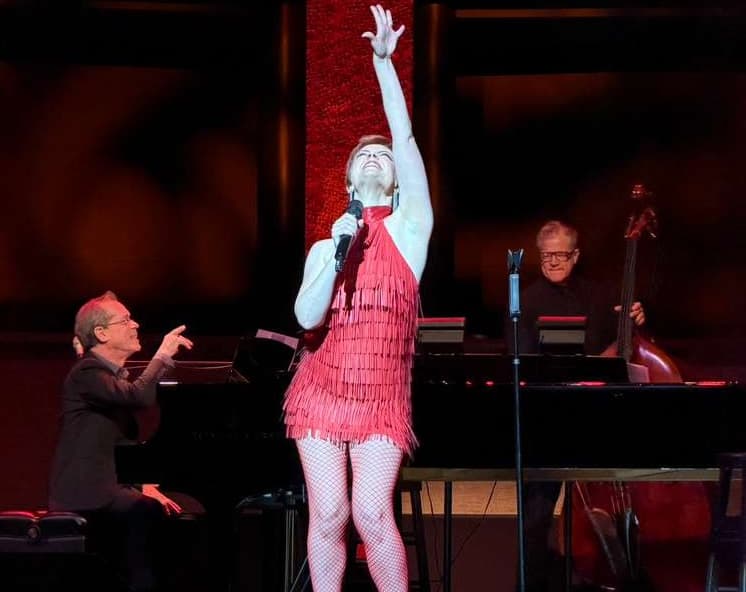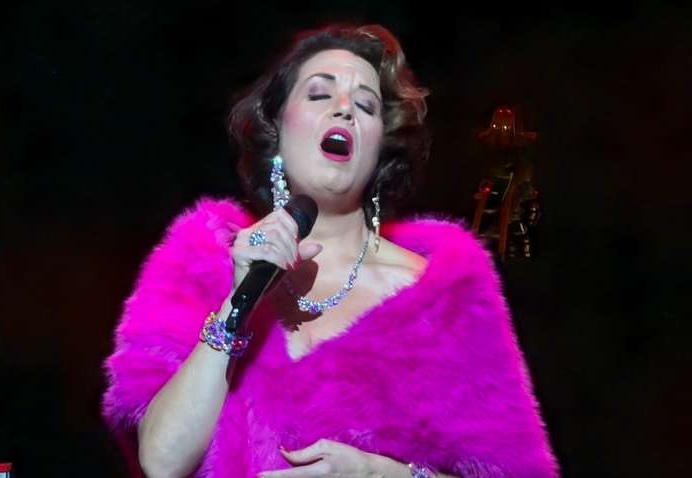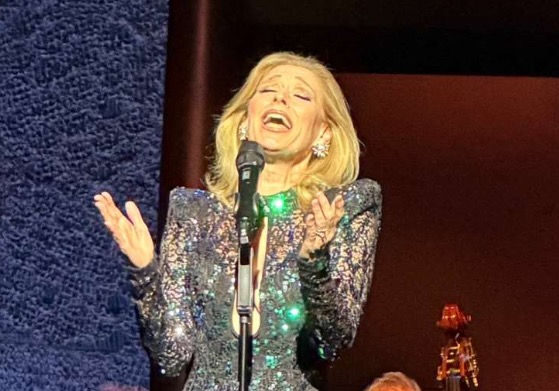2025 Cabaret Convention Gets Off to a Vampy Start at Rose Hall
The first concert marks an example of the two hosts, Andrea Marcovicci and Jeff Harnar, stealing their own show.

36th Annual Cabaret Convention
Presented by the Mabel Mercer Foundation
Rose Hall, Jazz at Lincoln Center
Through October 23
The first of three nights of the 2025 Cabaret Convention, titled “The Best is Yet to Come — A Celebration of Cy Coleman,” opened in a way that was taking no chances. The house lights went down and out onto the stage slinked Carole J. Bufford, looking the very picture of a sloe-eyed vamp in a short, tight, shiny sequined red dress plus matching fishnets and heels, singing an even more incendiary number, “Hey Big Spender,” from “Sweet Charity.”
Everyone in Rose Hall likely was well aware this classic 1966 musical was based on a Fellini movie about a sex worker. When Neil Simon adapted “Le Notti Di Cabiria” into a musical, he made the heroine a taxi dancer instead, though it was also widely known at the time that this was code for a streetwalker. In “Hey Big Spender,” Ms. Bufford spells all of that out.
In the show itself, the ladies of the evening are depicted as being highly blasé regarding the ho-hum tedium of sex work — which somehow makes them even more enticing in a Bob Fosse kind of way. Ms. Bufford, however, incarnated the song as pure erotic excitement. She flashed her eyes, she curled her upper lip, and she took a defiant stance that announced to the whole of Jazz at Lincoln Center that she wants it all: the sex, the money, and the Big Spender himself.
Ms. Bufford, one of the younger performers on the bill, sang what was easily the most adult song of the night. Conversely, she was followed by the two of the more senior, the evening’s hosts, Andrea Marcovicci and Jeff Harnar, who together sang Cy Coleman’s most innocent, playful, and childlike work, “A Doodlin’ Song.”
This nursery rhyme of a melody boasts a lyric (by Carolyn Leigh) that sounds like a toddler humming an ear worm and improvising words that are a combination of nonsense syllables interspersed with self-descriptive Italian musical terminology (“Obbligato, pizzicato”) and familiar Italo-American names (“Perry Como … Guy Lombardo”) as well as other infantile vocabulary — like “party poop.”
When Mr. Harnar and Ms. Marcovicci addressed the crowd, they stated that their ambition was to demonstrate the versatility and diversity of Seymour Kaufman, better known as Cy Coleman (1929-2004). And between “Big Spender” and “Doodlin’ Song,” they had already achieved precisely that.
Cy — who was a personal friend — started as a virtuoso jazz pianist before he started writing popular songs in the Brill Building era. Then he graduated to Broadway, and quickly became, alongside such peers as Jerry Herman and Stephen Sondheim, one of the towering giants of musical theater in the late 20th century.
Opening night was a long one — about three hours including intermission — and played out like a baseball doubleheader that opened with a string of home runs. After Mr. Harnar and Ms. Marcovicci, Bryce Edwards, armed with banjo, songophone (essentially a kazoo on steroids), and a few modulations, retrofitted “Hey There Good Times” as a vigorous, two-beat Dixieland bouncer.

Then, Eric Comstock and Barbaro Fasano, the most famously long-married couple in cabaret, delivered a characteristically ingenious mashup of Colemania that pivoted around “When in Rome,” a suitably saucy ode to infidelity, and “Little What If.”
Next, apple-cheeked Richard Skipper belted “It’s Not Where You Start” — one of Coleman’s rah-rah cheer-up marches — with letter-perfect Broadway bravado.
Then pianist-singer Nicole Zuraitis did precisely the opposite, giving us an introspective, moody “I Walk a Little Faster” inspired by the angular interpretations of Coleman by postmodern piano masters like Bill Evans and Keith Jarrett. Craig Rubano likewise made “On the Other Side of the Tracks” more inwardly facing and melancholy.
At this point we’re barely halfway through the first act. The second act pivoted around two classic Tony-winning hit shows via original cast members. For “Sweet Charity,” Lee Roy Reams reminisced about the show’s creation process, and for “City of Angels,” we were treated to a reunion of the original background vocal group, the Angel City Four, led by Amy London.
“Charity” was also highlighted by “Pink Taffeta Sample Size 10,” which was understandably cut but which Tovah Feldsuh reminded us is a swell song nonetheless, and another vocal quartet, Those Girls, whose name is generic but whose performance of “Rhythm of Life” was inspirational in multiple senses of the word.

Two more high-glam gals in sexy, sparkly drag turned on the torch with “Angels” tunes, in modes first light and then very dark: Leanne Borghesi with “You Can Always Count On Me,” followed by Ann Kittredge and “With Every Breath I Take.”
The Tuesday concert also marked an example of the two hosts stealing their own show. Andrea Marcovicci talked and charmed her way through “Isn’t He Adorable,” a song associated with convention namesake Mabel Mercer. And Jeff Harnar gave us a big payoff on “Witchcraft” – subtly sounding like the Sinatra of 1947 rather than ten years later.
The hosts then cleared the stage for headliner Ann Hampton Callaway to fire the climactic closing shot, with Coleman’s blockbuster standard “The Best is Yet to Come,” a song introduced by Tony Bennett and then immortalized by Sinatra and Count Basie. The hosts pointed out that it was so significant for Sinatra that the title became his epitaph — which both is and isn’t true.
“The Best is Yet to Come” was indeed on Sinatra’s headstone when he was first laid to his earthly rest in 1998, but somewhere along the line some cretinous goon essentially vandalized the grave and substituted a far less copasetic inscription.
Fortunately, we still have the song “The Best is Yet to Come” and Cy Coleman’s amazing songbook to listen to, not to mention another night of the Cabaret Convention.

